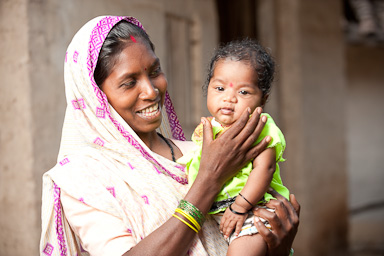This hospital in India is really looking out for the little guys (and girls)
|

As part of my work for PATH, I recently had the pleasure of visiting the Kasturba Hospital in Sewagram, India. My colleague and I were given a tour of the facility by a young doctor on staff there, Dr. Abhishek, and his enthusiasm for the hospital and its practices was, dare I say it, infectious. Aside from the open-air aspect of the main floor of the facility and the huge number of motorbikes in the parking lot, the hospital seemed to have many of the same things that we would find at most major medical centers in the US - an emergency room, X-ray and MRI machines, blood bank, pharmacy, etc. However, I was intrigued by what I learned regarding their common practices for women who come to the hospital to give birth.
Among the interesting facts Dr. Abhishek shared with us was that this hospital has been promoting breastfeeding within the first half-hour of birth for decades. Given breastfeeding's proven impact on reducing infant illnesses, including diarrhea and pneumonia, this seemingly progressive approach to initiating early breastfeeding has surely saved countless young lives in this central Indian district. I couldn't help but draw comparisons with my own experiences in giving birth at a hospital in Washington, DC. It wasn't until well over an hour after I gave birth that the nurses finally suggested that I try breastfeeding my son. From my work in child health, I knew that it would have been ideal to do it sooner. But, being a first-time mom and feeling completely unsure about everything, I found myself relying entirely on what the doctors and nurses in the hospital told me to do, and I was hesitant to speak up and suggest something different. It was great to hear that the women giving birth at Kasturba Hospital aren't faced with this situation, and instead are encouraged to begin breastfeeding right away.
In addition, no matter how natural and normal the delivery is, Kasturba Hospital always keeps mothers and babies as patients there for three full days after birth. Dr. Abhishek said that if a baby survives the first day of life, he is three times more likely to survive his first year. For that reason, they have a strong focus on the first 28 days of life, when most child deaths occur, and they have found that keeping a close eye on mother and baby for those first three days is critical to keeping them healthy in the longer term. In the US, women who have given birth naturally seem to be practically pushed out the door of the hospital just 24 hours after giving birth, so this seemed like a really different approach.
I'm honored to have had the chance to visit this hospital and learn about how it serves its local community so well, particularly its new mothers and their babies. It's easy to see why Dr. Abhishek enjoys giving these tours to visitors so much. They know what works best for their community and, most importantly, what keeps new babies healthy and thriving, and they have put that into practice in the best possible way.
-- Allison Clifford, Communications Officer for Vaccine Development program at PATH
Photo credit: PATH














